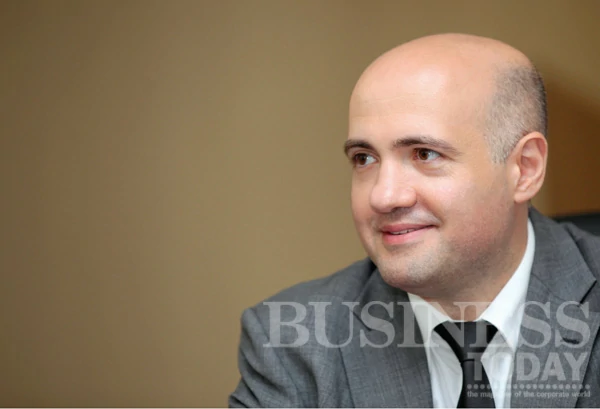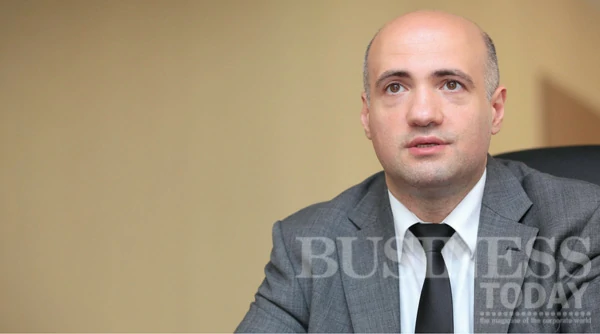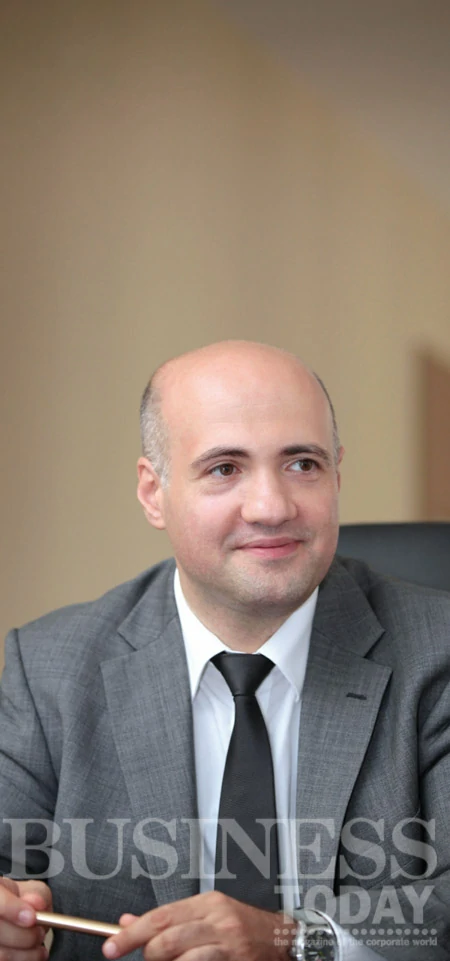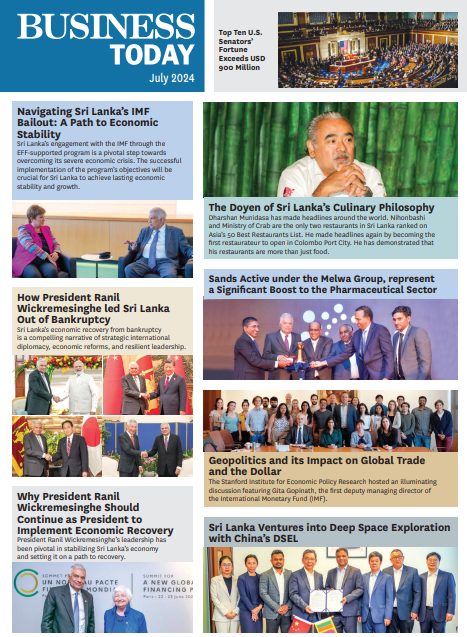
Dimitri Gvindadze is the former Finance Minister of Georgia and he was part of the team which transformed the country into a liberal fast growing economy. The country rose up to 9th place in the Ease of Doing Business Index in 2013 from 137th place in 2004, which is a great achievement. Georgia and Sri Lanka are almost similar in terms of GDP per capita; the two countries have much to learn from each other. Dimitri Gvindadze shared his thoughts on his visit to Sri Lanka where he delivered a lecture at the Eminent Speaker Series at the MILODA Academy of Financial Studies.
By Udeshi Amarasinghe Photography Menaka Aravinda
Georgia has seen rapid economic and political transformation during the last decade and you too have played a pivotal role during your tenure as Georgia’s Finance Minister. Can you elaborate on the economic reforms and what lessons can Sri Lanka learn from Georgia?
Georgia’s far-reaching reforms started in 2004, with the coming to power of the new government. There was strong government-wide consensus about the virtues of economic liberty. We thus took action to cut bloat in the public sector and to streamline the business environment so that it could be more conducive for the development of private entrepreneurship. Pro-growth reforms which we implemented in the early years of our liberal transformation set in motion dynamics which helped implement further secondary and tertiary transformations in the years that followed.
Look, for instance, at Georgia’s reform of the tax policy and administration. Back in 2003 we had 21 taxes. Some were progressive, difficult to administer, with loopholes. From 2004 onwards, we replaced these 21 taxes with seven and then six taxes and we also reduced tax rates. We abolished progressive taxation: all taxes became flat. What we saw as a result was substantial expansion of the tax base, improved compliance and increased tax revenue, both in absolute terms and as a percentage of the gross domestic product. Tax revenue to GDP ratio went up to around 25 percent, which is almost ten percentage points higher than before the reforms started. This is one good example of how higher degree of economic freedom can help.
When we realised that tax intake was becoming increasingly significant as a percentage of Georgia’s GDP, we introduced the Liberty Act which set the upper limit of the size of the general government expenditure at 30 percent of the GDP.
We Earmarked Substantial Public Resources To Enhance Infrastructure Spending On International, Secondary And Local Roads, Municipal And Urban Infrastructure, Flagship Energy Projects.
In the private sector, the major thrust of our reforms was to ensure economic openness, to bring down the barriers to trade, to make sure that permits, licenses and quotas, which affect the daily functioning of the businesses were effectively brought down to the optimal minimum. We worked to ensure that the bureaucratic apparatus which deals with the private sector is not over-staffed. We minimized cumbersome processes, removed excessive bureaucracy, introduced streamlined public services. We also privatized many state assets.
We reduced the number of licenses dramatically. There was a screening effort to get rid of the red tape which does not contribute to the level playing field in the private sector. We earmarked substantial public resources to enhance infrastructure spending on international, secondary and local roads, municipal and urban infrastructure, flagship energy projects. Such projects tend to produce excellent economic multipliers, fostering trade, improving living conditions and crowding in private investment and spending.
Sri Lanka too is in a period of transformation, what similarities do you see between the two countries?
Sri Lanka is living through very interesting times. There are several factors which contribute to the positive international mood about Sri Lanka. The country enjoys the recent peace dividend; it also has a very promising geography – it can benefit from the international transshipment routes. GDP has been growing fast in the recent years. The biggest challenge is to sustain this rapid growth, to make sure that there are no sudden slowdowns. In my humble opinion, and if Georgia’s experience through the recent decade can serve as any guide, the best way to accomplish this is to keep liberalising the economy by removing price controls, fostering flexibility of the exchange rate, improving business environment. All this provides the boost to the economy and opens up the hitherto unexplored pockets of economic growth.
Speaking of the similarities, Georgia and Sri Lanka are approximately at the same level in terms of their GDP per capita. When we launched reforms in 2004, Georgia’s GDP per capita was at around USD 1,000. Eight years on, it approaches USD 4,000. On the assumption that Georgia succeeds in sustaining growth momentum, it will reach the USD 10,000 GDP per capita level within the next decade – this is where Central and Eastern Europe are now.
There are certain similarities in structures of GDP of Georgia and Sri Lanka, with the bulk of both GDPs coming from services and with industry and agriculture amounting to the somewhat smaller shares of total outputs. Looking forward, relative weights of industry, services and agriculture in our gross domestic products are set to evolve in line with in-country trends and needs, also driven by global, exogenous developments. The best way to ensure that this evolution enhances competitiveness is to create and sustain regulatory environment which is conducive to the development of the private enterprise. What I believe needs to be avoided is industrial policies, whereby governments pick winners and losers, and limit exposure of industries to domestic and international competition. In other words, rather than micromanaging at sectoral and sub-sectoral levels, modern governments need to deal with framework conditions which foster positive market-driven dynamics in all sectors.
Georgia introduced additional institution building efforts, and new business-friendly economic legislation, this environment enabled massive foreign investment, what can you tell us about this, how would this relate to Sri Lanka?
There are several things that you need to do to attract foreign investors. In Georgia, average annual FDI to GDP ratio for the recent years stands at around 10 percent, which is higher than for many countries in Georgia’s broader neighbourhood, all this despite the global economic crisis. To succeed in reaching out to investors, you need to progress on a number of fronts.
The Liberalisation Policies Are Not About Selecting The Clear Winners Or Losers But Creating The Environment In Which The Domestic Enterprises Can Develop.
First, all investors look at the business environment. They look at the ease of doing business. How to open a business? How much time does it take to trade across borders, to deal with tax and custom administrations? How fast and efficient is public administration in responding to investors’ inquiries and in providing guidance? Business environment is, therefore, the very important pillar in the context of global economic positioning, and this applies to Georgia, Sri Lanka and all other countries.
Second, strength of the sovereign balance sheet matters and it influences upon investors’ perceptions of opportunities. Looking at a broad cross-section of countries, you will see that countries differ by the size of their general government spending. Such spending is in excess of 55 percent of GDP in some European countries, whereas in, say, Hong Kong and Singapore this ratio is at around 20 percent. At the end of the day, size of the government relative to the economy is the predominantly domestic choice, driven by a variety of factors. Personally, I believe that general government spending in excess of 30 percent of GDP inhibits growth. If you go beyond this level, you will start crowding out private sector, i.e. an economy becomes excessively dependent on the public sector, which may not be the best long-term option for any country.
Third, investors tend to look at debt burden of an investee country. Public debt management dynamics is of the essence, given the recent stream of debt-driven economic problems in the EU and the USA. Try to keep the public debt at the low level because the threshold of debt intolerance in developing and emerging economies is inherently lower than in advanced countries. USA and some of the EU countries can afford the level of public debt to GDP at above 70 percent, which is not the case with the majority of the developing and emerging countries. We have to be very conservative in terms of managing public debt.
Fourth, try to implement a proactive investment outreach effort; reach out and attend business forums, Sri Lanka is living next to demographically and geographically massive countries; you have India, China, South East Asia in close proximity. All these countries have increasing investor bases and they are on a lookout for bankable opportunities beyond their borders. Sri Lanka can capitalise on all of that if it can manage to build up its reputation as the macroeconomically stable and business friendly country where pro-business laws are adopted and implemented. You need to make sure that such laws and policies, once enacted, are here to stay, in other words that there is no danger of a policy drift in the future.
The Most Important Aspect About Georgia’s Reforms Is That These Reforms Were Not World Bank, IMF Or ADB Or Anyone Else’s Reforms, They Were Georgian Reforms.
Georgia has worked very closely with the World Bank and IMF, where the country has been praised for its extensive reforms. However, it is of paramount importance that reforms and measures stipulated by these institutions are localised according to the respective country. What are your thoughts on this?
The most important aspect about Georgia’s reforms is that these reforms were not World Bank’s or IMF’s or anyone else’s reforms, they were Georgian reforms in the first place. We came to power in 2004, with the inauguration of the President. We managed to squeeze in the most radical structural reforms into the first couple of years after the elections and that is very important. After the elections, each government enjoys a certain period of “honeymoon”. These periods don’t last forever, so it is important to put them to good use. So our reforms were of our own making, these were endogenous reforms stemming from the dedication and drive of the Georgians in the first place. The improvement of Georgia’s ease of doing business rank is the consequence of the liberal reforms that we implemented. The causality here goes from these reforms to the rankings and not vice versa.
In relation to working with these institutions what similarities do you see between Sri Lanka and Georgia and what can Sri Lanka learn from Georgia?
The lending products of the World Bank, IMF and ADB vis-a-vis Georgia and Sri Lanka are roughly the same because the GDP per capita levels are more or less the same. The economic growth rates are almost the same because we have been enjoying six-to-eight percent of real GDP growth in the recent years. And, Sri Lanka in 2010 and 2011 also enjoyed high growth.
I was in charge of donor coordination since 2005, and the funds were utilised, in the first place, for infrastructure development projects such as cross border roads, which helped to position Georgia as the regional hub economy. But, we also focused on local and secondary roads. And, these are the roads which connect small towns and larger cities, helping to develop the rural areas of the country. We have been also using the money from IFIs to develop urban infrastructure. Each year we have been singling out cities with significant tourism potential and where the architecture and the urban fabric need renovation. We have been beautifying facades of the buildings and rehabilitating underground infrastructure. I call this comprehensive urban regeneration. The very moment you as a sovereign move in to develop public infrastructure, you send a signal to the private sector that the given city has the future. Immediately, you crowd in interest of private stakeholders and investors. The private sector comes in and takes it over in terms of building restaurants, hospitality infrastructure so on and so forth. This is one of the examples where public action kicks in important economic multipliers. The energy sector and power transmission are likewise very important. In Georgia the generation and distribution of electricity is managed by the private sector. We have been building up the cross border backbone power transmission lines to make sure that hydro energy generated in Georgia can then be exported to neighbouring countries. We were getting budget support during 2008-2009, which were the worst years of the crisis and we have largely phased it out by now. By and large, the bulk of the donor assistance is now earmarked for the infrastructure development measures.
What are your thoughts on expanding the private sector?
Human dynamics in the public sector and the private sector are very different. The private sector is about the people who wake up in the morning and has to create value. If they do not create value they will not be able to feed their families. Wealth is thus created, first and foremost, in the private sector, by the private enterprise. This is similar for all countries. The major thrust of the public action is to create conditions conducive to the development of the private enterprise, to igniting private spirits.
It is important to project the business friendly image of the country. Sri Lanka has a very favourable geography with very strong and fast developing countries next to you. Maybe not immediately, but a few years down the line we will witness an incremental transformation of Sri Lanka into a regional hub economy. In other words, this will be the economy where businesses incorporate themselves for the sake of serving local market needs but also to produce in Sri Lanka and to export to other countries. You have amazing success stories in areas of garments and textiles, and I am sure this experience shall be multiplied and applied in other areas as well. The regional hub economy concept is something that we in Georgia have been pursuing with much success.
You Cannot Expand The Economic Base Without Having A Vibrant Private Sector In The First Place. Therefore You Liberalise The Economy And This Triggers The Expansion Of Your Economic Base.
It is four years since the end of the conflict in Sri Lanka. What are your thoughts on Sri Lanka’s current economic progress and development?
There is enormous enthusiasm about the future of Sri Lanka. Before coming here I read the reports of the rating agencies, I read the reports of IMF. They all emphasise on the peace dividend, which is very important. This peace dividend for a large extent has been driving growth in the last two to three years. The issues that the rating agencies mention is the burden of the public debt. In Sri Lanka it is going down and all of them are saying that it is going down. The government is basically doing a good job in the incremental reduction of the public debt to GDP ratio. That should continue as it is one of the key pillars of the global economic positioning. The rating agencies look at that.
You cannot expand the economic base without having a vibrant private sector in the first place. Therefore you liberalise the economy and this triggers the expansion of your economic base. By expanding the economic base you are going to build up your resilience when you are faced with exogenous shocks. These are the factors that everyone mentions, these are the vulnerabilities that the government too is addressing. I see that the public debt dynamics have been favourable in the past few years. If the country continues to move in this direction then you are going to remove very significant portion of uncertainties.
Investment?
Investment is going to come in increments. The peace dividends that the country enjoys is very recent.
Sri Lanka did not enjoy that dividend ten years ago, it is only three to four years ago that the effects of the peace dividend could be felt. Investors usually start investing after a certain period. On the assumption that you are able to manage this stability and continue with the structural reforms, the investors will come in. You have to be very proactive in reaching out to the Asian investors because they have the cash. These are the investors chasing opportunities all around the world. You have to make a very strong case as to why Sri Lanka is different; geographically, culturally, in terms of business environment so on and so forth. Try to be very proactive without focusing on a specific sector and saying ‘come and invest into these sectors’. Let the investor decide where to invest.
Can you tell us about your experience in the transformation of Georgia into an economic power in Europe?
We have not been transforming ourselves into a European economic power, we have been transforming ourselves into a liberal economy.
Let’s Try To Be Very Proactive Without Focusing On A Specific Sector And Saying ‘Come And Invest Into These Sectors’. Let The Investor Decide Where To Invest.
By transforming ourselves into a liberal economy we have been enhancing our relations with neighbours; with Turkey, Armenia and Azerbaijan focusing on regional cooperation. Later in 2013, Georgia and the EU will initiate the Association Agreement, with Deep and Comprehensive Free Trade Agreement being one important pillar of the Association Agreement. There will be no trade barriers, when you do not have trade barriers and your taxes are low and the business environment is liberal you are going to have an interesting array of investors coming to Georgia to open up their enterprises in Georgia, for the sake of serving both Georgian and European markets. That is the vision we have been pursuing on top of facilitating trade.
Can you talk a little bit more about the hubs?
One good example… We have many people from India studying in Georgia. There are hundreds of Indian students studying in the medical universities and doing internships in Georgia. We have developed the hospital sector with the aim of positioning ourselves by developing the medical tourism sector. Medical tourism is driven mainly by the private sector. Whatever can be devoted to the private sector in Georgia has been given to the private sector.
Georgia’s regional hub economy concept is working. For instance, Georgia’s major export industry is cars, both new and second-hand. We do not produce the cars in Georgia itself. Private entrepreneurs import the cars from various locations. Some of the cars need repairs, these are done in Georgia and the cars are then exported to countries in the South Caucasus and Central Asia. As a result, car export is of the essence for Georgia’s economy and that creates a lot of value and employment. We are trying to replicate similar approaches in other areas, including both services and manufacturing.
By thinking along the same lines, Sri Lanka may provide additional boost to its economy.
MILODA Academy of Financial Studies, is focused on the development of the public sector, Georgia too has similar academies, can you elaborate on the importance of such institutions?
I was the one who initiated the creation of the Academy of the Ministry of Finance in Georgia, though there were many other institutions, the Ministry of Justice, Ministry of Interior and all other ministries had academies. The biggest value of these academies is that they change the interaction between employers and employees. Employers thus provide much more than a salary – they help upgrade skills of employees, they make them more competitive and invest in their future. The non-cash dimension of the employee compensation is important in all countries and firms.
When You Introduce E-Governance, Electronic Services, When You Try To Streamline The Procedures In Customs, In The Tax Administration, When You Streamline The Whole Budgeting Process, You Are Basically Reducing Corruption Within The System.
As Sri Lanka forges ahead, what advice do you have for the country in defining its attributes for global economic positioning?
There are several pillars. First define the size of your public sector, try to make sure that you arrive to a sound tradeoff between public and private action. Then, structure and the quality of public spending. Try to spend as much as possible on capital infrastructure because you need that for this country at this stage of development. Sustainable public debt dynamics is very important. A conducive business environment is very important like all the reforms and a stable banking system. Sri Lankan banks are stable and I have not heard any complaints about the banking sector in Sri Lanka. Then, it is very significant to have proper investor outreach. When you introduce e-governance, electronic services, when you try to streamline the procedures in customs, in the tax administration, when you streamline the whole budgeting process, you are basically enhancing efficiency and reducing opportunities for corruption within the system. The consolidation of all these factors will contribute to the economic positioning of Sri Lanka or any other country because almost all the countries face similar challenges.
Relatively small economies like ours depend on a multitude of exogenous factors and exogenous trends, the good thing about the global investment landscape today is that it has become much more curious about the developing and emerging countries than before. Against this backdrop especially Asian countries have been growing very fast. There is increased interest by investors in these countries. Investors have become much more curious and the buy-side analytics has become much more detailed and nuanced about countries like Sri Lanka than before. Nowadays Sri Lanka has greater coverage by the private analysts, and this amplifies reports and analysis which have been traditionally done by international financial institutions. All in all, investor scrutiny of the developing and emerging countries has become much more granular than it used to be. And the countries that stand to succeed and benefit from these trends are those with stable public finances and conducive business environment.
Any final thoughts?
I wish Sri Lanka good luck








